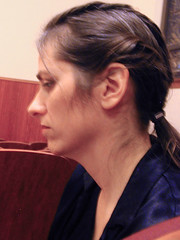 my best friend Mari did seem to enjoy the concert Saturday evening as much as I did -- and she knows inside-out the music they were performing. She's their number-one cellist, and the daughter of the director, conductor, manager, etc., Donna Hauge.
my best friend Mari did seem to enjoy the concert Saturday evening as much as I did -- and she knows inside-out the music they were performing. She's their number-one cellist, and the daughter of the director, conductor, manager, etc., Donna Hauge.The Monmouth Civic Orchestra took on a big project, this time. Instead of the Orchestra as a whole performing a few symphonic pieces, they broke up into smaller groups, in order to showcase some of the local and regional talent. It was two hours of chamber music... and no planned intermission. Under normal circumstances, one would expect to see the audience squirm after the first hour, but they were, by and large, there for the entertainment and to support the local arts.
The crowd was small,
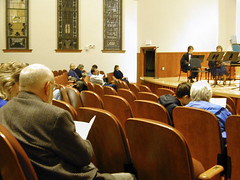 totalling perhaps 70 (certainly there were a few programs left over from the 130 I printed for them). But they rose quickly to their feet when asked, as the Monmouth Brass Quintet stood on the stage balcony to play the national anthem
totalling perhaps 70 (certainly there were a few programs left over from the 130 I printed for them). But they rose quickly to their feet when asked, as the Monmouth Brass Quintet stood on the stage balcony to play the national anthem 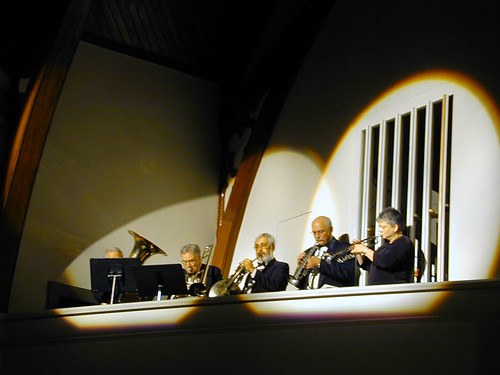
They sounded as crisp, lively, and professional as they looked -- maybe even moreso.
After the conclusion of the national anthem, the ushers allowed in the scant handful of late arrivals,
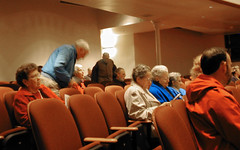 and as they seated themselves, the remainder of the concert got rolling. First, Robert Sibbing performed a solo from Albinoni's Concerto # V, opus 9 on the alto saxophone, supported by the String Ensemble
and as they seated themselves, the remainder of the concert got rolling. First, Robert Sibbing performed a solo from Albinoni's Concerto # V, opus 9 on the alto saxophone, supported by the String Ensemble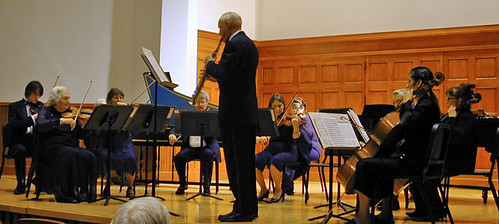
(click on picture for larger view and identification of performers)
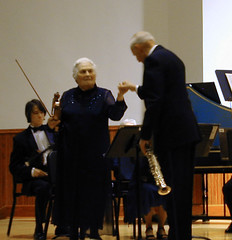
after which, the Ensemble performed Handel's Water Music and then a piece written by Macomb IL's Clifford Julstrom, Little March for Strings.
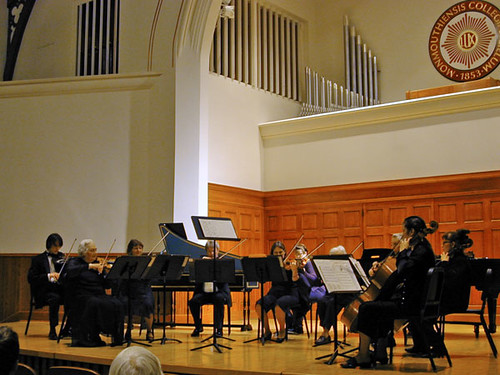
The 10-piece Ensemble made way for the String Quartet,
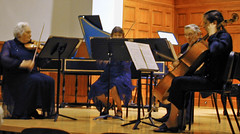 who played a suite from Purcell's opera, "King Arthur". They then surrendered the stage to the String Trio,
who played a suite from Purcell's opera, "King Arthur". They then surrendered the stage to the String Trio, 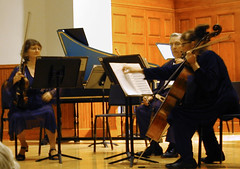 who performed Vivaldi's Sonate en Sol Mineur. In turn, they gave way to a father-and-son duet, featuring John and Harrison Graham
who performed Vivaldi's Sonate en Sol Mineur. In turn, they gave way to a father-and-son duet, featuring John and Harrison Graham 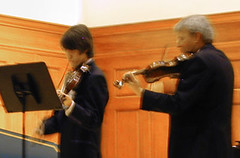
(my apologies for the picture quality. They
were a very active pair, and my camera was
not able to keep up with them)
performing Corelli's Opus I. The Piano Trio came next -- unfortunately, I began to have technical difficulties with my camera at that time, so I missed the shot of them. My apologies to Pamela Godt, Roxy Fess, and Rosa Julstrom for not showing them as they deserve. They were lovely as their playing.
My camera, given new batteries and a quick once-over on programming, was ready by the time John Spurgeon took his seat at the piano
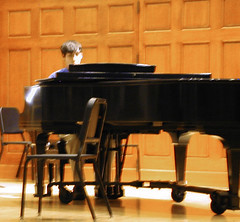 for "Music to Give By", the moment in each Civic Orchestra concert during which they pass the hat (well, technically, it's a pair of collection plates). They're not funded by any major organization, they're a teaching group, designed to offer new musicians an opportunity to "sit in" during performances with a collection of seasoned professionals, and get comfortable with the idea and the rhythms of an ensemble performance. Naturally, they need all the financial help they can get, since we're out in the boonies and they're neither a rock nor a bluegrass band... they took up a collection from the audience while John played Scott Joplin's "Maple Leaf Rag".
for "Music to Give By", the moment in each Civic Orchestra concert during which they pass the hat (well, technically, it's a pair of collection plates). They're not funded by any major organization, they're a teaching group, designed to offer new musicians an opportunity to "sit in" during performances with a collection of seasoned professionals, and get comfortable with the idea and the rhythms of an ensemble performance. Naturally, they need all the financial help they can get, since we're out in the boonies and they're neither a rock nor a bluegrass band... they took up a collection from the audience while John played Scott Joplin's "Maple Leaf Rag".When the collection plates had made the rounds, the Woodwind Quintet
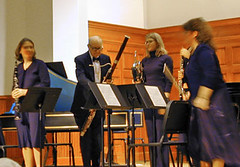 (there are five there, really!) took the stage, performing first the Queen Mary Suite by Henry Purcell, followed by Five Dances by Denes Agay.
(there are five there, really!) took the stage, performing first the Queen Mary Suite by Henry Purcell, followed by Five Dances by Denes Agay.When they finished the last notes of the Rhumba, they cleared their seats, the piano got pushed 'way back, and the Monmouth Brass Quinted took the main stage. At the end of their first number, the Sonata from Die Bankelsangerlieder, trombonist Ralph Butler rose from his seat,
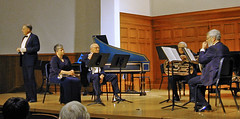 apologized for now suffering from a dry mouth, and said that, before he could play more, he would need a drink of water (this, he said, was the first time this had happened to him. Usually, as a brass player, he worried more about creating a pool of spit on the stage. That drew a hearty laugh from the audience). He then suggested the audience might need to stretch, as well, so we all took a five-minute intermission, then he returned to join the Quintet in playing "American Patrol" by Meacham, "My Heart Ever Faithful", by J. S. Bach, and then he rose to give the audience a little background on their upcoming number, "Monmouth Overture", by Malinda Zenor of Indiana. The most significant fact, he indicated, was that in the title were the words -- and I quote Mr. Butler on this "'of Monmouth Illinois', not Monmouth, New Jersey or Monmouth, Oregon."
apologized for now suffering from a dry mouth, and said that, before he could play more, he would need a drink of water (this, he said, was the first time this had happened to him. Usually, as a brass player, he worried more about creating a pool of spit on the stage. That drew a hearty laugh from the audience). He then suggested the audience might need to stretch, as well, so we all took a five-minute intermission, then he returned to join the Quintet in playing "American Patrol" by Meacham, "My Heart Ever Faithful", by J. S. Bach, and then he rose to give the audience a little background on their upcoming number, "Monmouth Overture", by Malinda Zenor of Indiana. The most significant fact, he indicated, was that in the title were the words -- and I quote Mr. Butler on this "'of Monmouth Illinois', not Monmouth, New Jersey or Monmouth, Oregon." 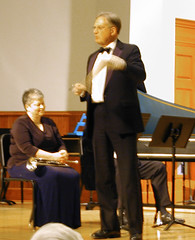 He grinned triumphantly and went back to his trombone to play the piece. They concluded the concert with performances of Maschwitz and Sherman's "A Nightingale Sang in Berkeley Square" followed by the Quintet No. 1, 3rd Movement, by Victor Ewald.
He grinned triumphantly and went back to his trombone to play the piece. They concluded the concert with performances of Maschwitz and Sherman's "A Nightingale Sang in Berkeley Square" followed by the Quintet No. 1, 3rd Movement, by Victor Ewald.They took a well-deserved bow,
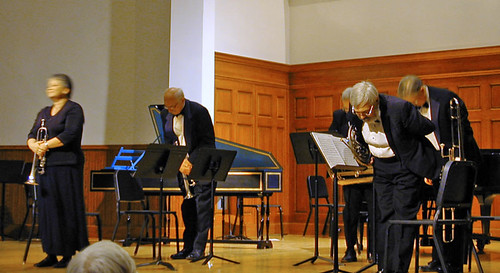 and that concluded the evening for most folks.
and that concluded the evening for most folks.I, however, had the pleasure of being there as Harrison Graham sat down at the piano and played the theme music from a video game (was it "Final Fantasy"?), as his father explained, he had picked apart by ear and reworked on piano... for the fun of it. I didn't take a picture of him at it, because I suspected he might have become more self-conscious about his playing there and then. But the performance was strong, lively, and a really neat way to cap off the evening.
If you weren't one of the small crowd gathered to support the MCO, you missed a kick-hindquarters evening of entertainment.
No comments:
Post a Comment